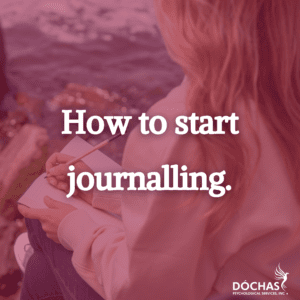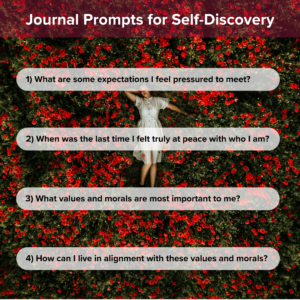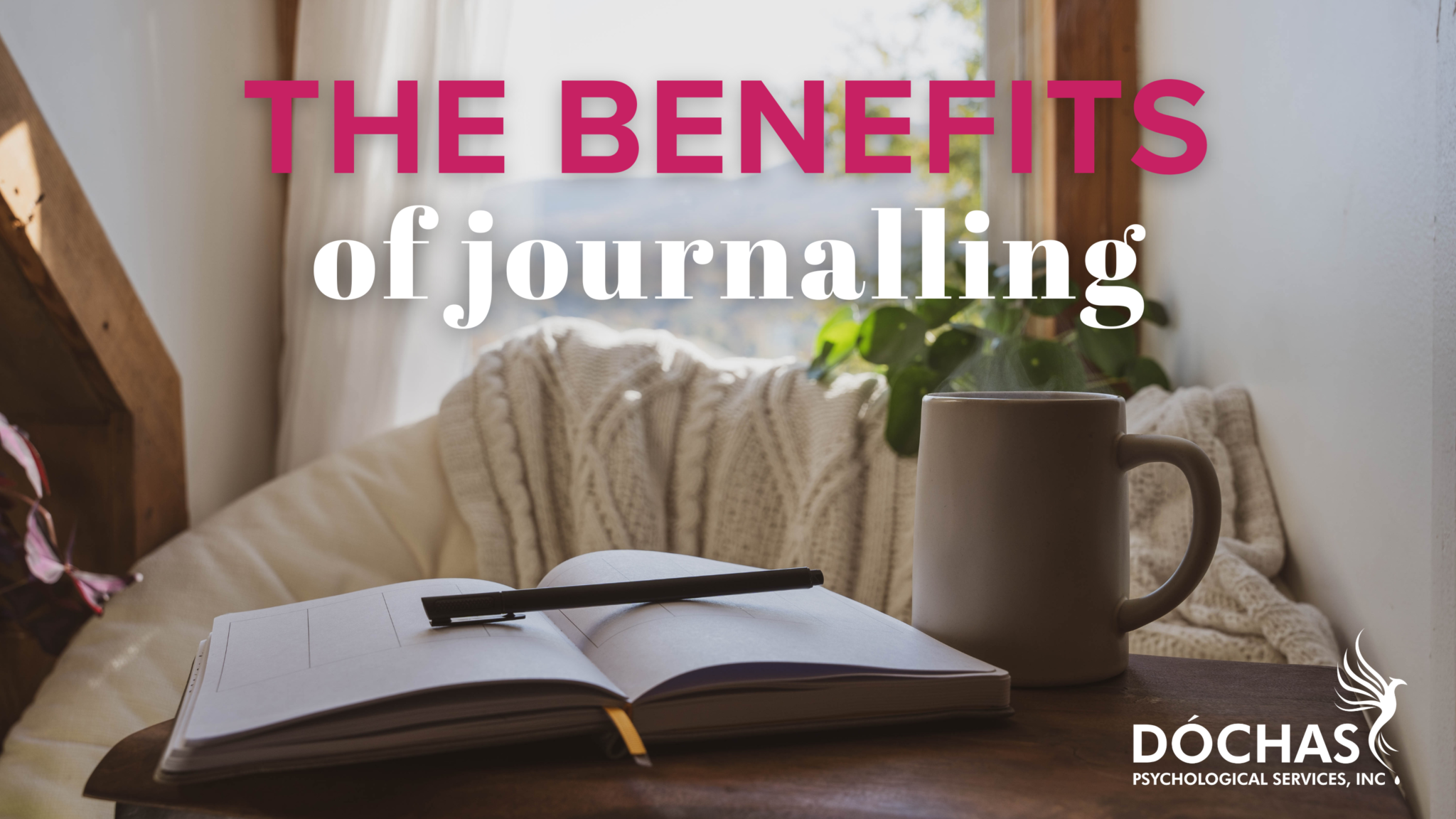Whether you’ve heard about journalling from a mental health professional here at Dóchas in Spruce Grove, or read it in an article or self-help book, you’ve probably heard that it has many benefits. It’s Melanie on the blog this week, and I know what you may be thinking: “Does it really help? It’s just writing…”.
Maybe you’re one of those people who have made an honest attempt at journalling but were unsure how or where to start. If this rings true for you or if you have never thought about journalling before, I am going to explore the benefits on our mind and body and tips to get started.

Does Journalling have Physical Health Benefits?
We all know that our mind and body are intricately connected. It is then no surprise that if journalling is good for your mind, it must be good for your body as well.
What are these supposed health benefits then? They include lowered blood pressure, improved functioning of some organs (liver and lungs), shorter hospital stays, and fewer stress related doctor visits. In addition to improved health, journalling has also been proven to increase productivity by the way of fewer work absences, less time out of work following a job loss, and increased grades for students.
How does Journalling Improve Mental Health?
I want to take a moment to also discuss the mental health and cognitive benefits reported. These include fewer depressive symptoms, less avoidance, emotional catharsis, improved cognitive processing & mood, and reduced harmful thoughts and feelings. Journalling can facilitate stress management, reduction of anxiety, regulating emotions, improved awareness of events and insight, and helps stop the cycle of obsessive thinking and ruminating, as well as help people recovering from the emotional trauma that occurs with PTSD.
How do I Start Journalling?

It is evident that there are several benefits to journalling. So where do you begin if you want to give it a shot? Here are several tips that you can use to help get you started:
- Commit to a specific and regular time in your schedule that works. It is important to be flexible with this time and be willing to change if necessary.
- Choose your medium. Are you a pen and paper kind of person, or are you more into technology and would feel more comfortable with a computer? Gather tools necessary before beginning.
- Decide where you want to journal. Ideally, you can write in a location that is comfortable and has minimal distractions. Would a quiet corner in your house be best, or would it be better for you to be out in nature or at your favorite coffee shop?
- Make your commitment small, just a few minutes each session. Feel free to continue longer should the mood hit you.
- Don’t worry about grammar, spelling, or punctuation.
- The topics you can write about are so diverse. Write about anything that comes to mind. It might be about your day, or about a specific event. It could include impactful conversations you had during the day, or worries that have been plaguing you. It is an opportunity to explore any thoughts and feelings that come up. You can take time to express gratitude, or write about dreams or goals. What you write about is completely up to you.
- Understand that you may experience short-term emotional distress at first. Be sure to be kind with yourself and give yourself grace as you write about difficult topics. It is okay to stop journalling if the practice becomes too distressing.
Guided Journalling
Guided journalling can be a great place to start if you are having trouble getting started or want help working on a specific area. It can provide writing prompts or predetermined questions or topics for exploration.
Guided journalling tools can be purchased from several different locations such as your local bookstore, Amazon, or can even be found for free online! After a quick search I was able to find guided journalling tools that work to tackle worry, panic, perfectionism, grief and loss, social anxiety, phobias, self-esteem, and self-discovery.
Sierra wrote some journal prompts for self-discovery here.

There are also several free apps that can be used that offer guided journalling – for example, the MindShift CBT App.
Whatever your reason or motivation, make a plan to begin journalling and allow it to bring benefits into your life. If you’d like guidance getting started, please reach out to us at Dóchas at 780-446-0300 or info@dochaspsych.com. Book an in-person appointment in Spruce Grove or a virtual appointment in Alberta with one of our therapists here.
References
About Dóchas Psychological
Dóchas Psychological Services is a well-established and trusted therapy clinic located in Spruce Grove, Alberta. At Dóchas we value the idea that everyone deserves a safe space. Through connection and education, our team works hard to build a trustworthy relationship with each of our clients. It is our goal to create a community for our clients to feel like they belong.
Disclaimer
Information provided through Dóchas Psychological Services blogs or vlogs is meant for educational purposes only. They are NOT medical or mental health advice. You can read more about our disclaimer here.









